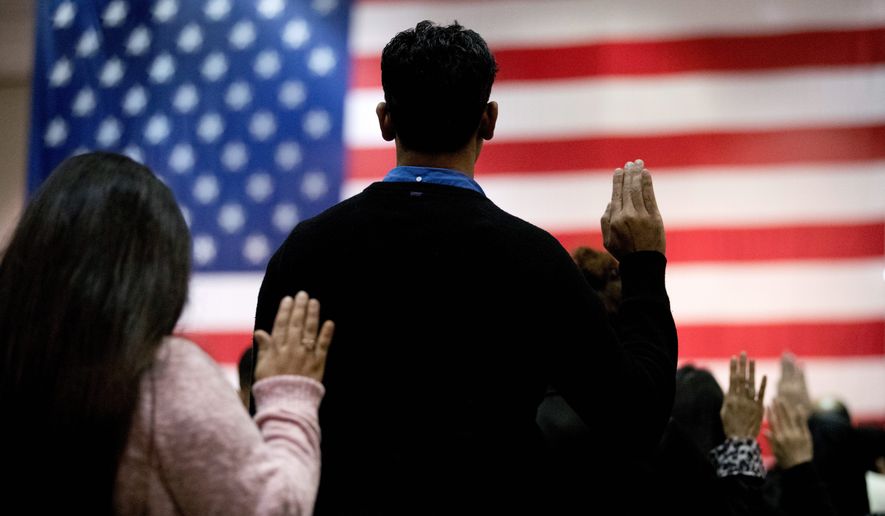Legal immigrants lined up to apply for U.S. citizenship ahead of last year’s election, but the Obama administration let them down, as the agency responsible for approving applications botched the process, leaving tens of thousands of eligible people stuck in limbo.
The Department of Homeland Security blamed the problem on a spike in applications, but the numbers don’t bear out that explanation. Applications rose 14 percent compared with the 2012 election year, but the backlog surged 64 percent.
Instead, the department’s watchdog says the problem can be traced to a troubled computer system that U.S. Citizenship and Immigration Services deployed last year that was supposed to help move the agency from a paper-based system into the digital age. The rollout of the system was so flawed that USCIS was forced to cancel naturalization interviews and even citizenship ceremonies for fear of giving out erroneous approvals.
It’s a serious bungle for the $1 billion computer system, dubbed ELIS in honor of Ellis Island, and it’s a major black eye for an agency that is already facing questions over its processing of refugees and that would be called upon to handle any legalization program Congress would approve.
It’s also a striking snafu for the Obama administration, which advocates hoped would be prepared to help hundreds of thousands of new citizens sign up in time to vote last year against Donald Trump’s immigration plans.
“We are very concerned,” said Rosalind Gold, senior director of policy at the NALEO Educational Fund, who led a push for new sign-ups last year. “It is very critical for people who really want to become U.S. citizens — they’re committed to our nation, and they want to become full Americans, and they should expect to get good customer service.”
The government began last year with about 390,000 pending applications, which is about the usual number, and was averaging four months of processing time. It ended the year with more than 635,000 applications in its backlog and was taking far more than four months. In the final quarter of the year, it received nearly 240,000 applications and processed just 112,000 — less than half its intake.
Those on the front lines say they have seen the problems up close.
“In our Chicago office, we are getting lots of inquiries from people who are waiting for their citizenship applications to be processed, so we sensed there had been a slowdown,” said Douglas Rivlin, spokesman for Rep. Luis V. Gutierrez, an Illinois Democrat who has been a top advocate for eligible legal immigrants to apply for citizenship.
Mr. Rivlin said the congressman’s office is being “inundated by new citizenship applicants.”
“Many are green card holders who want to travel outside the U.S. and are nervous about President Trump’s visa policies. Many of them are applying for citizenship and delaying their travel until they are sworn in as citizens, which means the backlog is inconveniencing a lot of long-term legal immigrants in the congressman’s district,” Mr. Rivlin said.
USCIS, in a statement, blamed a larger-than-expected workload.
“Due to the significant increase in the number of applications for naturalization USCIS has received in the past year, customers may experience increased processing times regardless of the system being used to process their case,” the agency said in a statement to The Washington Times.
But advocates had warned the agency that they would try to register more people, and the USCIS numbers belie their explanation. The backlog grew by 64 percent last year, while the number of applications was up just 27 percent compared with 2015. Compared with 2012 — and election year, when activists tried to register new citizens — applications were up only 14 percent.
Citizenship was just one of the areas where USCIS fell behind last year. It also amassed a huge backlog of people applying for asylum and built up a backlog in applications for President Obama’s deportation amnesty for young adult illegal immigrant Dreamers, known as DACA.
USCIS also suffered a problem late last year in the employee verification form, the I-9, which businesses are required to fill out for every new hire. The agency realized that from Nov. 14-17 its computer program was changing applicants’ Social Security numbers.
Homeland Security Inspector General John Roth has been on the case, spotting a number of problems and issuing several high-priority alerts. He has repeatedly warned the agency about ELIS, citing “alarming security concerns.”
The inspector general’s office told The Times that the background check and printing problems were so bad that the agency was canceling naturalization interviews and even had to halt some naturalization ceremonies to avoid giving out potentially erroneous documents.
Faster approvals would not have changed the outcome of last year’s election. Relatively few immigrants were stuck in the backlog in Pennsylvania, Wisconsin and Michigan — the three states that swung the election to Mr. Trump.
Mr. Trump topped Democratic nominee Hillary Clinton by more than 27,000 votes in Wisconsin. The backlog of naturalization applications from Wisconsin as of Dec. 31 was just 3,307, meaning that even if all of them had been approved in time and had voted for Mrs. Clinton, they still wouldn’t have come close to overcoming Mr. Trump’s lead.
• Stephen Dinan can be reached at sdinan@washingtontimes.com.




Please read our comment policy before commenting.